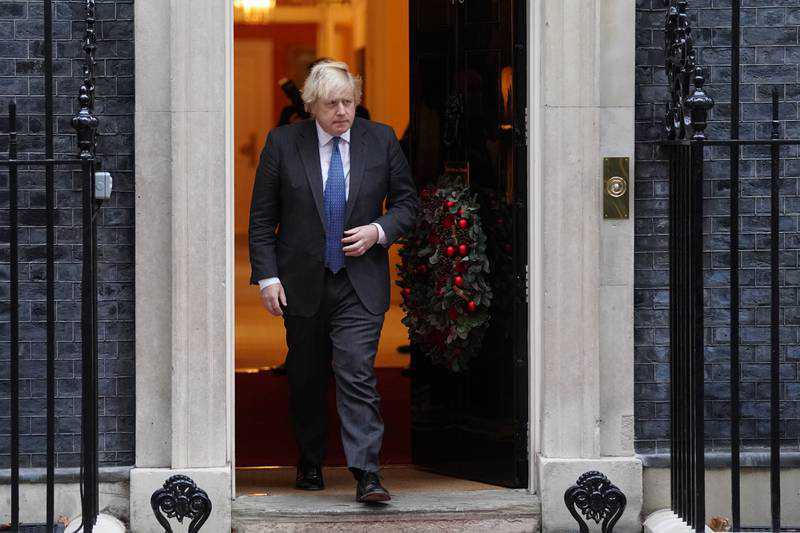UK ministers 'resist calls for new restrictions before Christmas'
21 December, 2021

British ministers have reportedly opposed calls from scientific advisers for new measures to tackle the Omicron variant before Christmas.
Confirmed cases of the faster-spreading strain have risen by more than 12,000 in the UK, with London’s cases topping 10,000, the latest data on Sunday showed.
But about a third of the Cabinet are said to be reluctant to support new restrictions in coming days, with Prime Minister Boris Johnson and Chancellor Rishi Sunak among them, The Times reported.
It reported that 10 ministers are resisting a call by the government’s chief scientific adviser, Sir Patrick Vallance, at the weekend for new restrictions as soon as possible to prevent the National Health Service being overwhelmed.
Mr Johnson has been presented with three options to tackle the spread of the virus, according to the Daily Telegraph.
The paper reported that they range from guidance asking people to limit indoor contacts, to rules on household mixing, social distancing and an 8pm curfew on pubs and restaurants, to a full lockdown.
The Telegraph quoted one unidentified Cabinet minister as saying data presented by Dr Vallance and England’s chief medical officer, Prof Chris Whitty, on Saturday was “just trashed by the Cabinet”.
The source said “guidelines, rather than restrictions, are entirely possible”.
Health Secretary Sajid Javid said it was time to be “more cautious” and did not rule out new measures before Christmas, telling BBC One that there were “no guarantees in this pandemic”.
Mr Javid said that if new rules were to be proposed, Parliament would be recalled to approve them, describing that as “only right and proper”.
London Mayor Sadiq Khan said that if restrictions were not brought in soon, the NHS could be “on the verge of collapse”, with sickness affecting workforce levels.
Education Secretary Nadhim Zahawi has called on former teachers to help with staff shortages in the new year, while head teachers’ unions have warned of possible disruption to classroom lessons.
Meanwhile, the Treasury announced on Sunday that funding to tackle Covid-19 across Scotland, Wales and Northern Ireland had been doubled to a total of £860 million ($1.13 billion).
Mr Sunak said the boost, which followed an increase in demands from the three nations for more cash funds the rise in Omicron cases, was to ensure people were supported “in the face of this serious health crisis”.
Advice from the Scientific Advisory Group for Emergencies, or Sage, published at the weekend, said there were probably already hundreds of thousands of new Omicron infections every day in England.
It said that hospital admissions with the variant in the UK were “probably around one tenth of the true number” because of a lag in reporting.
England’s chief nursing officer, Ruth May, has urged a “final festive booster bounce” for the vaccine programme, telling people there was “no room for complacency” and to book their slots, which included Christmas Day.
While a record 830,403 boosters were given in England on Saturday, a rate of around one million a day is needed if every adult is to be offered a third shot by the end of the year.
Daily deaths in England of people with the variant have risen to 12, while hospital admissions of patients with confirmed or suspected Omicron increased to 104, the latest figures from the UK Health Security Agency show.
Another 12,133 confirmed cases of the variant had been reported across the UK, the data on Sunday showed, bringing the total confirmed cases of Omicron across the four nations to 37,101.
In total, a further 82,886 lab-confirmed Covid-19 cases had been recorded in the UK as of 9am on Sunday, the government said.
Experts have warned against a delay in bringing in measures.
Prof Stephen Reicher, a member of Scientific Pandemic Insights Group on Behaviours, said Omicron’s faster transmissibility means it is “coming at us like an express train”, and called for clear messaging to the public.
“A good clear message is more important now than ever before of how serious the crisis is," Prof Reicher told BBC News.
“Good information from the government, combined with good support from the government” would probably lead to people accepting “the measures that are necessary to bring this thing under control", he said.
Source: www.thenationalnews.com
